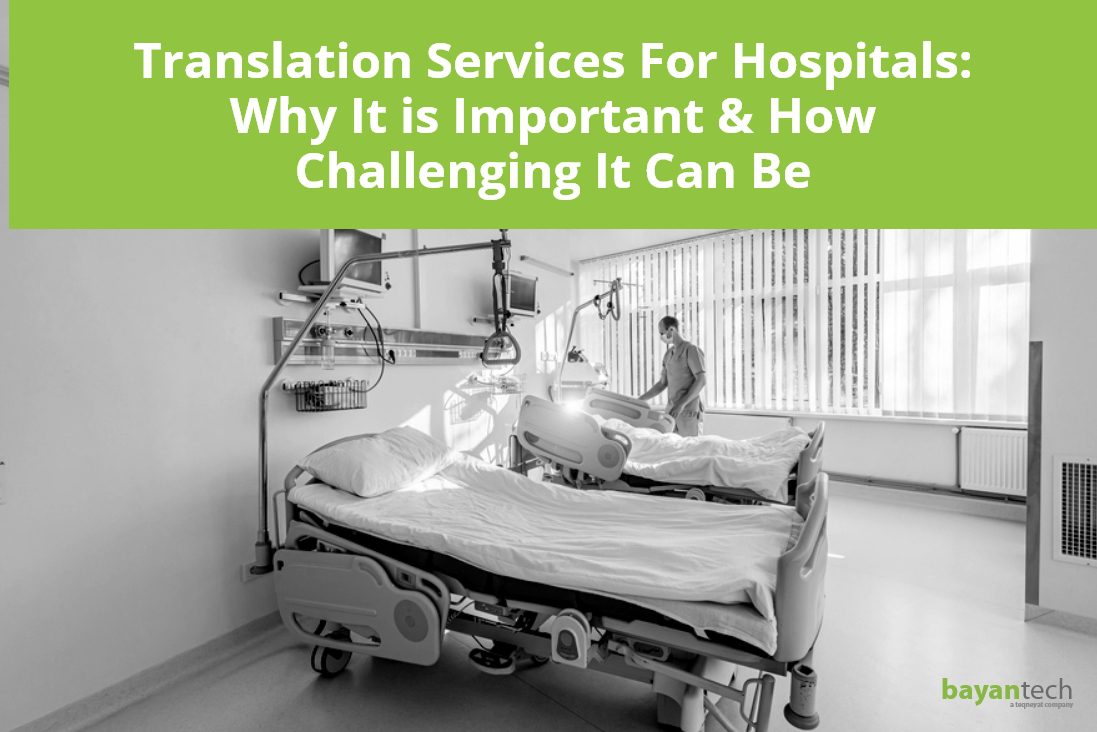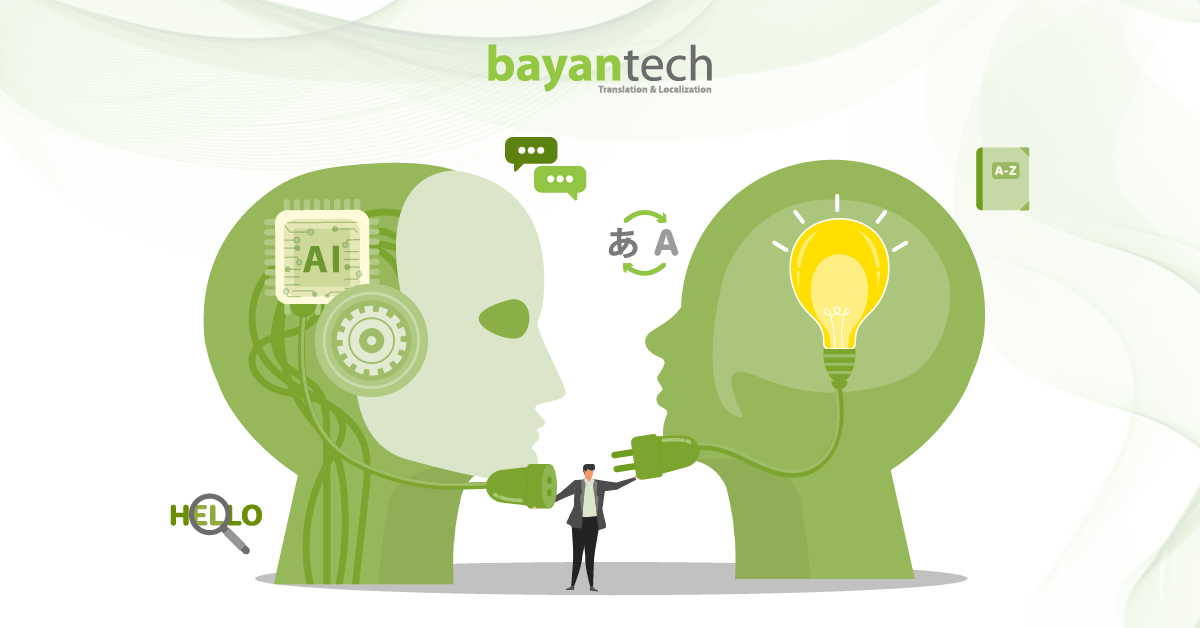Language services have become an essential part of providing quality care for an increasingly diverse patient population.
Patients with limited English proficiency are facing numerous challenges in accessing healthcare worldwide. They are less likely to receive regular primary health care and are more likely to report overall problems with their care and be at risk of experiencing medical errors.
To mitigate this, healthcare providers must bridge the language barrier by integrating translation services for hospitals.
But with the intricacy of the translation and interpretation services, the options for how a hospital can meet language needs are vast and can be confusing.
This comprehensive guide will walk you through the world of translation services for hospitals. We will explore the different translation services hospitals should consider, explaining medical translation importance and offering ways to address common challenges associated with providing language access in healthcare settings.
So let us get started.
Table of contents
Types of Translation Services Hospitals Should Consider
What language and translation services do your hospital and patients need?
While you understand the importance of language support to connect with diverse communities and ensure equitable access to quality healthcare, the process of deciding which services you require can pose challenges.
However, we are here to streamline this process and make it easier for you. Let us explore the various translation services available and show you how to select the most suitable of them for your needs.
- 1. Medical Translation Services
These are translation services for medical-related documents and hospitals’ websites/portals into languages commonly spoken by patient populations. And they are vital for ensuring written communications and materials are accessible to patients in their preferred language.
However, they do not just aim at making materials linguistically accessible, but at truly helping limited English patients navigate the entire healthcare experience from consent forms to discharge instructions.
Some of the key content translation services for hospitals cover:
- Patient Admission and Discharge Forms
- Website/Portals
- Medical Consent Forms
- Medical Reports and Summaries
- Prescription and Medication Instructions
- Hospital Policies and Procedures
- Medical Correspondence
- 2. Medical Interpretation Services
Medical interpretation services are professional interpreting provided in a healthcare setting to facilitate communication between medical staff and patients who do not speak the same language or have limited proficiency in the language of their healthcare providers.
You can rely on medical interpretation services in
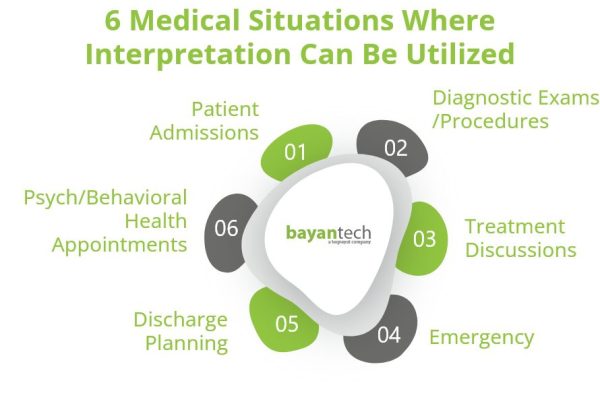
- Patient Admissions
- Diagnostic Exams/Procedures
- Treatment Discussions
- Emergency
- Discharge Planning
- Psych/Behavioral Health Appointments
There are three types of interpretation services available to meet patients’ different needs in healthcare settings.
- In-person Interpretation
This service offers hired interpreters who can be present for appointments, procedures, and hospital stays to facilitate direct communication between patients and providers.
Their job becomes highly Important for complex medical discussions that cannot be handled over the phone or via video conferences.
- Over-The-Phone Interpretation
Telephonic interpretation services can be quickly accessed on-demand when an in-person interpreter is not available. This service can be really useful for shorter, routine interactions.
- Video Remote Interpretation
Video interpretation gives you access to an offsite medical interpreter via video conferencing, and it is more personal than phone interpretation and more suitable for physical examinations.
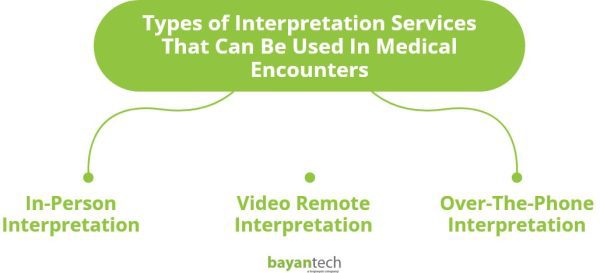
Why It Is Necessary To Employ Professional Translation Services For Hospitals & Healthcare Settings
Effective communication is the cornerstone of healthcare. Language barriers can hinder the exchange of important information between healthcare providers and patients.
And this hindrance not only undermines the attainment of optimal healthcare outcomes but also carries the potential for severe health complications for patients and serious legal ramifications for healthcare providers.
Let us explore together what value professional translation services can add to patients and hospitals and learn more about the consequences of miscommunication in healthcare settings.
- To Ensure Informed Patient Consent
Informed consents require patients to fully comprehend the nature of their medical condition. And for consent to be truly “informed,” patients must fully understand what’s at stake.
They need to comprehend the nature of their medical condition, the details of any proposed procedures, potential risks and benefits, alternative options, and any other relevant information. Only then can their consent be meaningful.
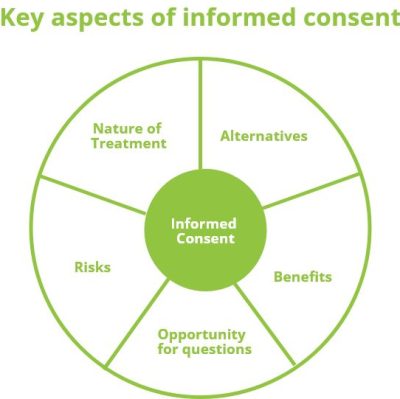
But when language barriers exist, achieving this level of understanding becomes impossible. Key details remain lost. Crucial nuances are missed. Important questions go unasked. Patients are left signing forms they can’t read, trusting doctors and nurses but not truly comprehending what they are consenting to.
Translation services bridge this gap by facilitating effective communication between healthcare providers and patients who do not share a common language. Informed medical consent translation services, in particular, enable the accurate transmission of crucial information, ensuring that patients can comprehend the nature of their medical situation.
- Francisco Torres & The Case of Mistaken Consent
In 2010, Francisco Torres experienced a tragic misunderstanding due to Language barriers at Riverside Parkview Community Hospital Medical Center in California.
The hospital failed to communicate effectively with the Spanish-speaking Torres before having an operation to remove a diseased kidney, which led him to unknowingly consent to remove his healthy kidney.
The medical center was suited and struggled with a series of legal, financial, and definitely reputational complications.
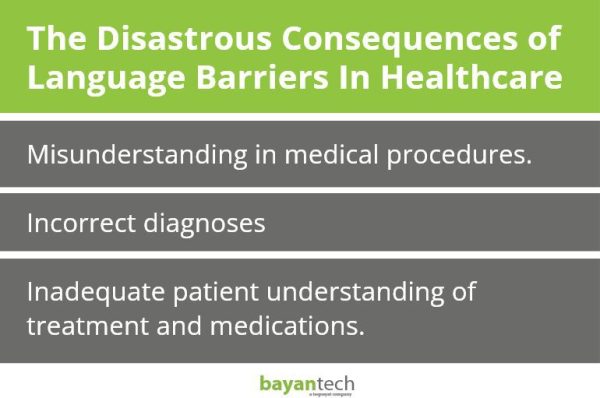
- To Comply With Legal Obligations
Hospitals have a moral and legal obligation to provide language services for limited English-proficient patients. This is to allow them to effectively communicate with medical staff and make informed decisions about their health.
Many countries around the world enforce strict laws mandating providing language services for LEP patients in healthcare settings. And according to these laws, hospitals and healthcare facilities have to ensure optimal language access for them through professional translation and language interpreting services.
This, in turn, helps mitigate the risk of regulatory enforcement actions, lawsuits, fines, or penalties for failing to provide adequate language services for patients in need of them.
Let us have a look at some of these regulations in the US.
The USA Regulations For Language Access in Hospitals & Healthcare Settings
In the United States, over 46 million individuals do not use English as their primary language, and more than 21 million speak English less than very well.
Hospitals that receive government funding in the US are legally obligated to facilitate communication for LEP patients through language services. And failing to do so could result in fines and legal liability.
1. Title VI of the Civil Rights Act of 1964 requires any hospital that receives federal funding to provide language assistance services to limited English proficient (LEP) patients at no cost. This applies to both Medicaid and Medicare participating hospitals.
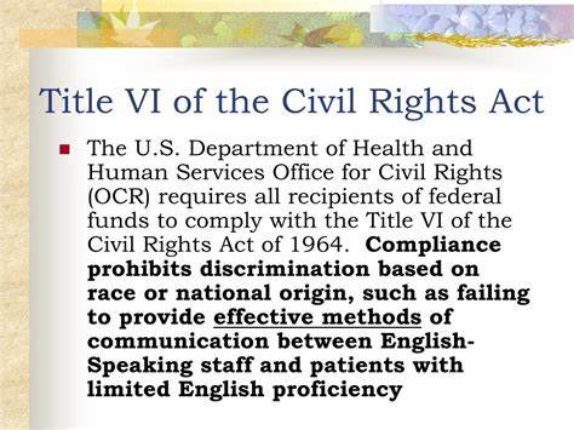
2. Many states also have their own laws mandating hospitals to provide language services. For example, California’s Dymally-Alatorre Bilingual Services Act requires state-funded programs to provide language assistance.
- To Improve Patient Experience
If you are a healthcare provider and you want to ensure a positive experience for patients who have limited English proficiency or are non-native speakers of the country’s language, investing in translation services should be your ultimate choice. Let us tell you why.
Being heard and understood in your mother tongue makes a huge difference, especially when it comes to receiving healthcare. Patients who have access to qualified interpreters and get the necessary medical documents in their native language tend to worry less and feel more at ease.
They are more able to effectively communicate all their concerns, questions, and needs, which ultimately results in a more positive patient experience.
Also, breaking down language barriers for patients helps to foster a sense of trust, empathy, and inclusivity within the healthcare setting. It creates a supportive environment where every individual can receive the care they need, regardless of their native language. And this is something patients truly appreciate and it makes them more satisfied with their experience.
Curious to know to what extent language barriers can negatively impact patient experience in healthcare settings? Check out the following statistics.
Key Statistics On The Negative Implications of Language Barriers In Healthcare
According to The National Library Of Medicine:
1- Among patients who received treatment from nurses who did not speak the local language
- 30% had difficulty understanding medical instructions.
- 30% had issues with the reliability of the information due to the language barrier.
- 50% believed the language barrier contributed to medical errors.
2- Among patients who did not speak the local language:
- 49% had trouble understanding a medical situation
- 34.7% were confused about how to use their medication
- 41.8% had trouble understanding medication labels
- 15.8% had a bad reaction to medication due to not understanding instructions
- 66.7% faced barriers to accessing healthcare
- 20% did not seek healthcare due to fear of not understanding
3- Many patients with limited local language proficiency
- Experienced adverse health events that caused detectable physical harm (49.1%)
- Experienced moderate temporary harm (46.8%)
- Experienced some failure in communicating with medical providers (52.4%)
- To Improve Patients Outcomes
Professional translation services for hospitals not only result in a better patient experience but also have the potential to promote better healthcare outcomes. So how?
Patients with limited English proficiency may struggle to provide a comprehensive medical history, leading to incomplete or inaccurate information and consequently improper diagnosis and negative clinical outcomes.
They are more likely to have higher odds of inpatient mortality and an increased hospital length of stay (LOS) compared to proficient English-speaking patients.
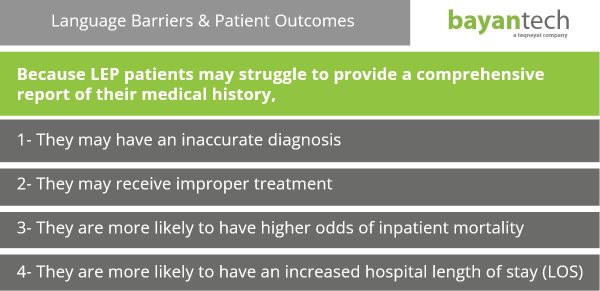
On the contrary, integrating language access into patients’ care can bridge this gap by enabling accurate conveyance of patients’ medical history to healthcare providers, which enables physicians to make informed decisions about diagnosis and treatment.
It also increases the likelihood of patients comprehending and following treatment instructions, resulting in much better patient outcomes.
And since translation services for hospitals have the ability to alleviate patients’ stress and foster a supportive environment, patients also become more likely to have better emotional well-being, which can positively impact their overall recovery.
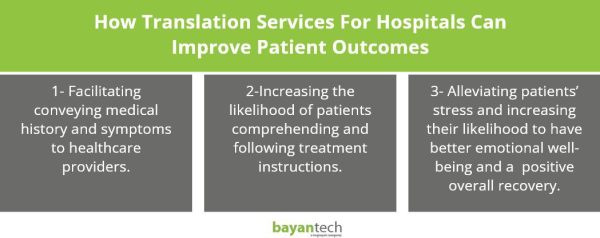
A recent study on the impact of language on patient outcomes during COVID-19 has revealed significant results that show the direct connection between language barriers and the likelihood of patients experiencing severe outcomes and having higher death rates. Let us explore it together.
- Language Barriers & Patient Outcomes During The COVID-19 Pandemic: A 2O22 Study
The study revealed that patients with limited English proficiency had a 35% higher risk of severe outcomes or death in wave 1 of the pandemic. Why did that happen?
- Language barriers led to delays in seeking care and the ability to navigate the US healthcare system.
- Isolation policies limited in-person interpreters.
- Masks made phone interpretation difficult.
- Doctors struggled to understand the symptoms and medical history of these patients.
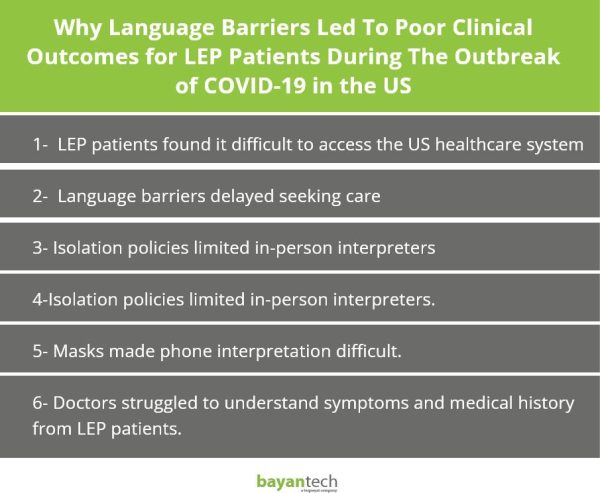
However, when hospitals started to make changes regarding language access for LEP patients in wave 2 of COVID-19, language barriers were no longer a reason for poor clinical outcomes. These changes included:
- More phone/video interpretation was available.
- Staff had improved cultural awareness.
Sign up to our newsletter to receive the latest blogs and news.
5 Challenges Of Translation Services For Hospitals
- 1. Quality & Accuracy
Quality and accuracy are two of the key requirements of translating in this high stake domain where one mistake can have severe clinical consequences. However, maintaining them is also one of the common challenges associated with hospital translation.
This is because the medical domain comes with its own intricate terminology, complex concepts, and nuanced information that pose a unique challenge for translators and healthcare providers alike.
- Interpreters & Translators
- Must be not only proficient in the source and target languages but also possess deep knowledge of the healthcare sector and its specific terminology.
- Must be very precise and neutral when conveying the message without omitting, adding, or expressing their personal views.
- Must work efficiently and accurately under tight deadlines and in urgent situations, which can increase the pressure and potentially impact the quality of the translation
- Hospitals & Healthcare Providers
- Need to be really selective when choosing translation and interpretation service providers. Qualified, experienced professionals with relevant certifications and a proven track record in the healthcare sector will offer the highest levels of quality and accuracy.
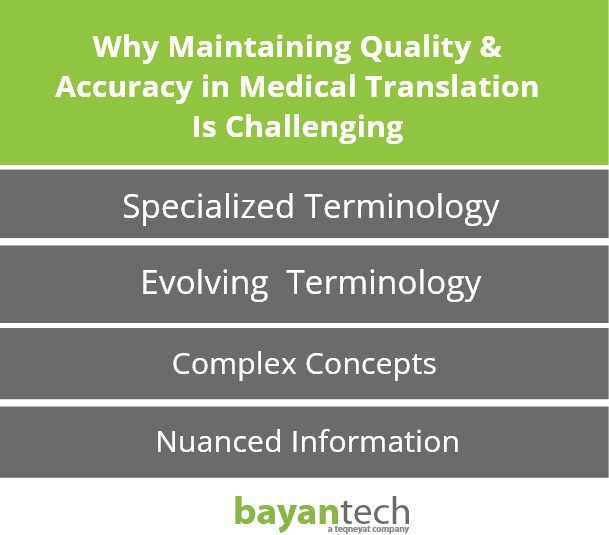
- 2. Urgency
Healthcare settings often involve time-sensitive situations where quick and accurate communication is critical.
Emergencies, urgent medical procedures, and time-sensitive diagnoses require immediate access to translation and interpretation services, which can be really challenging unless you are working with highly qualified language service providers. So why?
- Interpreters are often needed on short notice to facilitate emergency consultations, procedures, and crisis interventions.
- Family members seeking information also require prompt language assistance during stressful situations.
- Delays in any part of the communication chain can lead to medical errors, non-compliance, complications, and even legal issues.
Partnering with professional providers of translation services for hospitals grants you this timely access to language services. They are readily available during off-hours or in remote areas, and well-equipped to address the urgent needs of patients anytime, anywhere.
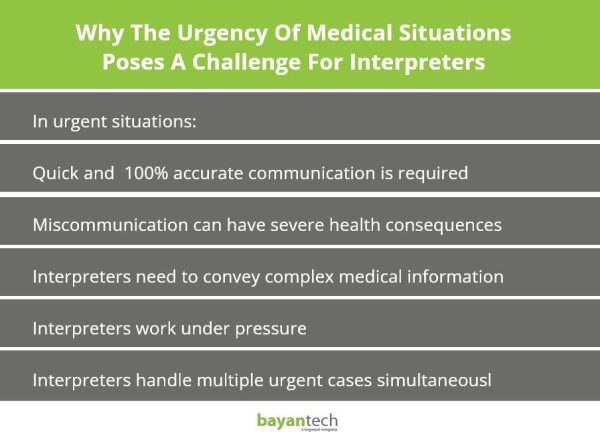
- 3. Multidisciplinary Communication
Being involved in multidisciplinary communication also poses a significant challenge for healthcare interpreters.
Medical specialists from different fields often need to collaborate and exchange complex information to provide the best patient care. This requires interpreters to not only translate between languages but navigate diverse medical disciplines and specialized vocabularies.
An oncologist discussing a patient’s cancer treatment with a cardiologist, for example, may use terminology and concepts that are unfamiliar to an interpreter without specialized oncology or cardiology knowledge.
Inaccurate interpretations in these multidisciplinary exchanges can lead to misdiagnoses, medical errors, and ineffective treatments, which all impact clinical outcomes and patient health.
To ensure accurate translations, healthcare interpreters must either be expert generalists with an in-depth understanding of multiple medical disciplines, or specialized interpreters must be available for each specialty involved.
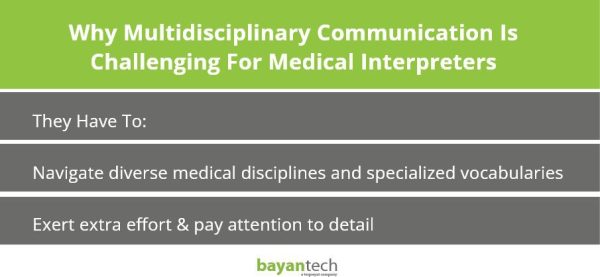
- 4. Patient Confiditionality & Ethical Consideration
Healthcare providers have a legal and ethical obligation to protect patient confidentiality and privacy.
Ensuring that patient information remains confidential and secure is often one of the first challenges healthcare providers face when choosing a translation company. Wanna know why?
Healthcare organizations are bound by stringent legal regulations, such as the Health Insurance Portability and Accountability Act (HIPAA) in the United States or the General Data Protection Regulation (GDPR) in the European Union to protect patient data. And failure to do so exposes them to strict penalties for breaches.
And, hence, the challenge is to find a professional provider of translation services for hospitals that train their interpreters and translators on patient confidentiality, data protection, and ethical considerations to ensure the highest level of trust and privacy for patients.
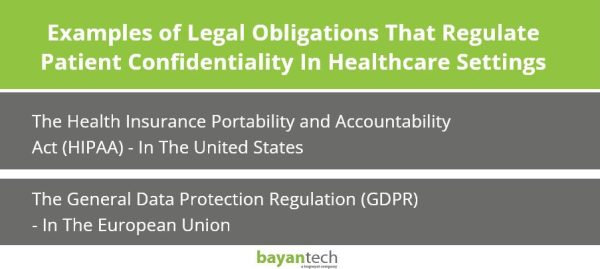
- 5. Diverse Patient Population
Healthcare settings serve diverse patient populations with various languages, cultures, and backgrounds. This diversity poses challenges in providing translation and interpreting services that cater to the specific needs of each patient.
Different languages have unique structures, idiomatic expressions, and cultural nuances that can be difficult to convey accurately. Translators and interpreters must possess a strong command of both the source and target languages to ensure precise communication.
Additionally, the diversity of dialects spoken by patients can be another challenge for interpreters. The wide range of dialects adds complexity to the task, as they may have unique vocabulary, grammar structures, and even different pronunciations of words.
This necessitates interpreters to have a comprehensive understanding of various dialects to facilitate effective communication while ensuring accuracy and clarity.
How Can Hospitals Overcome The Common Challenges Associated With Medical Translation Services?
Ensuring quality and accuracy is not impossible in the medical context. All you need to do to avoid all of these common challenges is to lean on language experts.
bayantech stands out as the ideal choice for medical translation and interpretation services. We are ISO 17100 and 9001 certified and pride ourselves on our specialization in medical translation, combining our exceptional linguistic skills with extensive medical knowledge.
Our team of expert translators and interpreters possesses a deep understanding of medical terminology, ensuring precise and contextually appropriate translations.
Being native speakers with backgrounds in both medicine and linguistics, they possess the necessary expertise to handle complex medical document translation and manage sensitive medical encounters across different dialects.
We also implement strict quality assurance processes in place including our 3-EYE (Translation, Editing, and Proofreading) process, back translation, and linguistic validation to ensure that your medical communications are accurate, precise, and of the highest quality.
Trust us to bridge the language gap and ensure that every patient receives the highest quality of care, regardless of their native language. Contact us today or request a translation services quote now.
8 Steps Every Medical Interpreter Takes
Looking for a medical interpreter? Discover the career path of medical interpreters and qualifications they need to acquire to take on interpreting jobs.

